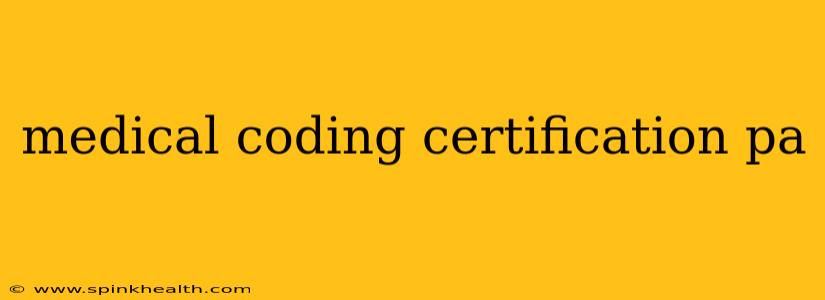The steady hum of a busy medical office, the quiet concentration of deciphering medical records, the satisfaction of knowing your work directly impacts patient care – this is the world of medical coding. And if you're in Pennsylvania and considering a career in this vital field, you're in the right place. This guide will walk you through everything you need to know about obtaining your medical coding certification in the Keystone State.
My name is Sarah, and I've been a medical coder for over 15 years. I've seen firsthand the impact skilled coders have on the healthcare system, and I'm passionate about helping others find success in this rewarding profession.
Let's embark on this journey together.
What is Medical Coding?
Before we dive into Pennsylvania-specific certifications, let's briefly define what medical coding entails. Medical coders translate medical diagnoses, procedures, and services into numerical and alphanumeric codes. These codes are used for billing insurance companies, tracking healthcare statistics, and ensuring accurate record-keeping. Think of them as the universal language of healthcare finance. Without accurate coding, healthcare providers wouldn't be reimbursed correctly, and critical data for research and public health would be unavailable.
Types of Medical Coding Certifications in PA
Pennsylvania doesn't have its own state-specific medical coding certification. However, nationally recognized certifications are widely accepted and highly valued by employers throughout the state. The most common certifications include:
-
Certified Professional Coder (CPC): Offered by the American Academy of Professional Coders (AAPC), this is arguably the most widely recognized certification in the field. The CPC exam is comprehensive, testing your knowledge of anatomy, physiology, medical terminology, and coding guidelines.
-
Certified Coding Specialist (CCS): Awarded by the American Health Information Management Association (AHIMA), the CCS credential is another respected certification that demonstrates proficiency in coding and medical billing.
-
Certified Coding Associate (CCA): Also from AHIMA, the CCA is an entry-level certification ideal for those new to the field. It provides a strong foundation and can serve as a stepping stone to the CCS.
These certifications are generally earned through a combination of education and examination. Let's explore the educational pathways available in Pennsylvania.
How to Become a Certified Medical Coder in PA
There are several avenues to pursuing a medical coding certification in Pennsylvania:
1. Formal Education Programs:
Many community colleges, vocational schools, and universities in Pennsylvania offer associate's degrees or certificates in medical coding and billing. These programs provide structured curriculum, hands-on training, and often assist with exam preparation.
2. Online Programs:
The flexibility of online learning has made it increasingly accessible to pursue medical coding certification. Numerous accredited online schools offer comprehensive programs that mirror on-campus options.
3. Self-Study:
While possible, self-study requires significant self-discipline and dedication. It's crucial to utilize reputable study materials, practice exams, and potentially consider mentorship from experienced coders.
What are the requirements to become a Medical Coder?
This question often overlaps with the educational paths above. The specific requirements vary depending on the certifying organization (AAPC or AHIMA) and the certification level (e.g., CPC, CCS, CCA). Generally, you'll need:
- Education: Completion of an accredited coding program is highly recommended, though not always mandatory.
- Experience: Some certifications may require a certain amount of hands-on experience, particularly for advanced certifications like the CPC.
- Examination: All certifications require passing a rigorous exam that tests your knowledge of coding guidelines, medical terminology, and anatomy.
How long does it take to become a Certified Medical Coder?
The timeframe depends on the chosen educational path and your dedication. A formal program could take a year or more, while self-study can vary greatly. Remember, consistent study and effective exam preparation are key to success.
What is the average salary for Medical Coders in Pennsylvania?
The average salary for medical coders in Pennsylvania varies based on experience, location, and employer. However, you can expect a competitive salary that allows for a comfortable living. Researching salary data for specific regions within Pennsylvania will give you a more precise estimate.
What is the job outlook for Medical Coders in Pennsylvania?
The job outlook for medical coders in Pennsylvania is generally positive, mirroring the national trend. The growing demand for efficient healthcare billing and record-keeping ensures continued employment opportunities.
This comprehensive guide provides a solid foundation for your journey towards a medical coding certification in Pennsylvania. Remember to research specific programs and certifications to find the best fit for your individual needs and aspirations. Good luck on your path to a rewarding career!

